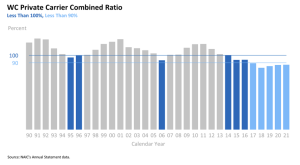Happy Monday – for my American readers, hope your holiday was most excellent.
here’s good stuff you might have missed…
WCRI is hosting a no-cost webinar on Behavioral Health in Workers’ Compensation Thursday Dec 15 at 2 pm eastern. The webinar will discus their recent primer on BH in WC (available here for download)
The good folks at NCCI published their latest take on work comp industry financials...suffice it to say the party continues…although it may be getting close to ending.

courtesy NCCI
The final countrywide analysis of 2021 results shows:
-
-
- WC Calendar Year 2021 private carrier net written premium (NWP) increased from 2020 by 0.5% to $38.2 billion
- The WC Calendar Year 2021 private carrier combined ratio was 87.2%, and the operating gain was 23.7%
-
Meanwhile early data makes 2022 look even better; direct written premiums were up almost 10% over 2021, while the loss ratio for the first two quarters of 2022 is even lower (!!!) then 2021 (no figures cited).
Unpacking this –
- If 2022 numbers hold up 2022 will be the tenth year in a row profits exceeded the historical average…
- And the sixth consecutive year the operating margin was above 20%
- Oh, and this all happened while rates decreased every year since 2014
My take…insurers are still enormously profitable because rate declines aren’t accurately accounting for the opioid hangover.
[A CWCI report addressed this issue; my informed opinion is claims without opioids are much less costly, therefore the continued drop in opioid prescriptions is driving lower claims costs…actuaries develop rates based on historical data – which is not keeping up with what’s actually happening.]
Former Labor Secretary Robert Reich believes organizations aren’t valuing workers correctly…Reich notes workers are considered “costs” instead of assets, a mis-characterization that leads to all manner of bad executive decisions.
Key line –
“increasingly, corporations aren’t just production systems. They’re systems for directing the know-how, know-what, know-where, and know-why of the people who work within them.”
Hat tip to a very good friend for the head’s up.
What does this mean for you?
- It’s great to see behavioral health get more exposure – it is a key driver of recovery.
- Actuaries use historical data to project the future; execs should factor in what’s really happening to understand where things are heading.



I have seen in the past an errorneous focus on behavioral health as a medical condition that requires healthcare professional involvement. The claims adjuster is the primary contact with the injured worker. she should trained in how to deal with behavioral issues such as aggressiveness, abuse, avoidance, procrastination and manipulation as well as how to ascertain if a behavioral health professional is warranted. This training of adjusters can be done by behavioral health professionals who themselves are trained in competence improvement, such as psychologists who know “deliberate practice.” Build the competency of the adjuster; don;’t focus on how to refer.
Hey Peter and thanks for the note.
My take is there is little time allocated to training adjusters these days and case loads remain high, limiting the time an adjuster has to identify and appropriately address BH concerns. I’d suggest a nurse or other clinician already trained in BH would be a better intermediary/assessor.
There are also qualitative and quantitative tools and other assessment approaches that can help identify potential issues that are affecting patients.
I’d strongly encourage all to attend WCRI’s webinar – you’ll get excellent information.
be well Joe
Glad to see the plight of the adjuster being discussed in the comments. Hearing/seeing a lot of great ideas to improve our industry but almost always they involve adding yet another task onto the adjuster. Hard to attract new talent to the career when we struggle to set our current adjusters up for success. Once the adjuster job was portrayed as the worst career in “The Incredibles” movie, we lost control of the optics. Hoping to change that! Really enjoying your articles, Joe- and the comments too- always learn a ton.
Thanks for your observations Amber – and they are spot on.
I try to sit with an adjuster and another front line person for an entire day at least once a year so i am reminded about who actually does the work, how they do it, what drives them nuts and what makes them happy and fulfilled.
be well Joe